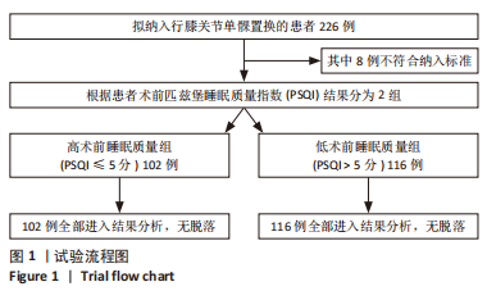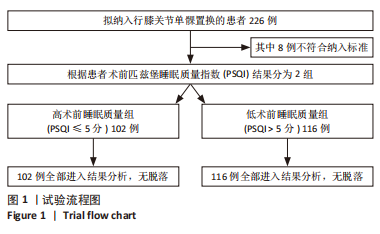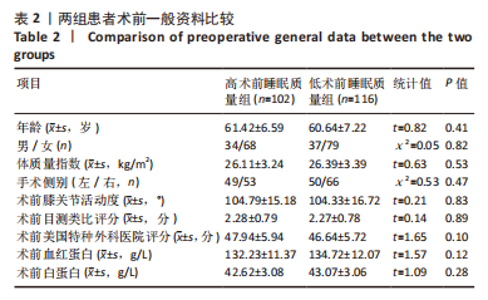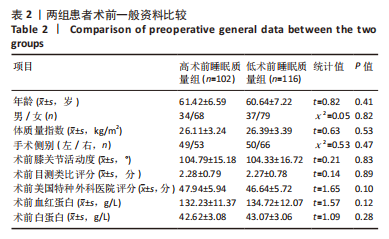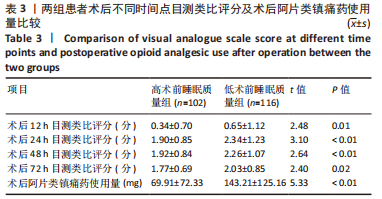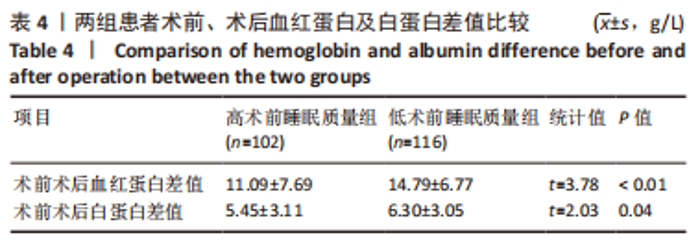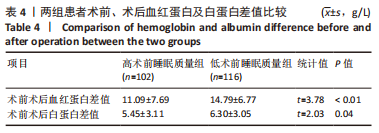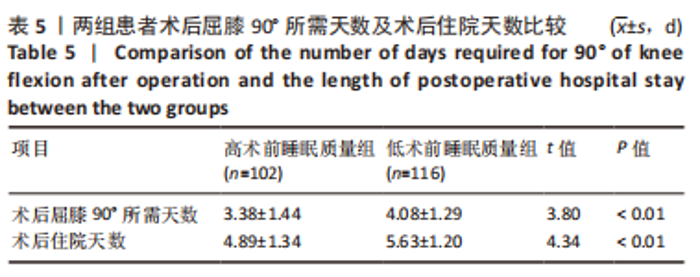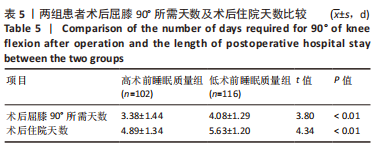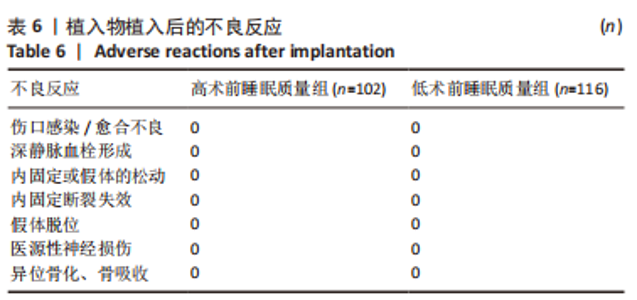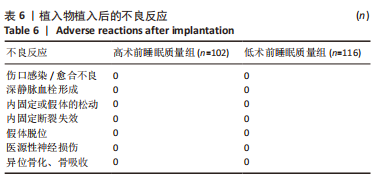Chinese Journal of Tissue Engineering Research ›› 2023, Vol. 27 ›› Issue (36): 5806-5811.doi: 10.12307/2023.706
Previous Articles Next Articles
Relationship of preoperative sleep quality and early rehabilitation after unicompartmental knee arthroplasty
Zhu Xunpeng, Xu Hui, Wang Lin, Wang Jun, Zhang Hui
- Department of Joint Surgery, First Affiliated Hospital of Anhui Medical University, Hefei 230022, Anhui Province, China
-
Received:2022-09-20Accepted:2022-11-08Online:2023-12-28Published:2023-03-24 -
Contact:Zhang Hui, MD, Chief physician, Department of Joint Surgery, First Affiliated Hospital of Anhui Medical University, Hefei 230022, Anhui Province, China -
About author:Zhu Xunpeng, Master candidate, Department of Joint Surgery, First Affiliated Hospital of Anhui Medical University, Hefei 230022, Anhui Province, China
CLC Number:
Cite this article
Zhu Xunpeng, Xu Hui, Wang Lin, Wang Jun, Zhang Hui. Relationship of preoperative sleep quality and early rehabilitation after unicompartmental knee arthroplasty[J]. Chinese Journal of Tissue Engineering Research, 2023, 27(36): 5806-5811.
share this article
Add to citation manager EndNote|Reference Manager|ProCite|BibTeX|RefWorks
| [1] SNELL DL, DUNN JA, JERRAM KAS, et al. Associations between comorbidity and quality of life outcomes after total joint replacement. Qual Life Res. 2021;30(1):137-144. [2] CANOVAS F, DAGNEAUX L. Quality of life after total knee arthroplasty. Orthop Traumatol Surg Res. 2018;104(1S):S41-S6. [3] 赵中溢, 李勇阵, 陈峰,等.同期双侧全膝关节置换和单髁置换治疗创伤性关节炎的比较[J]. 中国组织工程研究,2021,25(6):854-859. [4] PONGCHAROEN B, TIMJANG J. The outcomes of mobile bearing unicompartmental knee arthroplasty and total knee arthroplasty on anteromedial osteoarthritis of the knee in the same patient. Arch Orthop Trauma Surg. 2020;140(11):1783-1790. [5] LYONS MC, MACDONALD SJ, SOMERVILLE LE, et al. Unicompartmental versus total knee arthroplasty database analysis: is there a winner? Clin Orthop Relat Res. 2012;470(1):84-90. [6] KAHLENBERG CA, RICHARDSON SS, GRUSKAY JA, et al. Trends in Utilization of Total and Unicompartmental Knee Arthroplasty in the United States. J Knee Surg. 2021;34(10):1138-1141. [7] HANSEN EN, ONG KL, LAU E, et al. Unicondylar Knee Arthroplasty in the U.S. Patient Population: Prevalence and Epidemiology. Am J Orthop (Belle Mead NJ). 2018;47(12) . doi: 10.12788/ajo.2018.0113. [8] IRWIN MR. Why Sleep Is Important for Health: A Psychoneuroimmunology Perspective. Ann Rev Psychol. 2015;66(1):143-172. [9] NOWAKOWSKI S, LEVY-MEEKS ME, DAWSON DB, et al. Association of preoperative sleep pattern with posthysterectomy pain: a pilot study. J Clin Sleep Med. 2020;16(11):1901-1908. [10] DOLAN R, HUH J, TIWARI N, et al. A prospective analysis of sleep deprivation and disturbance in surgical patients. Ann Med Surg (Lond). 2016;6:1-5. [11] IMERI L, OPP MR. How (and why) the immune system makes us sleep. Nat Rev Neurosci. 2009;10(3):199-210. [12] MORGAN D, TSAI SC. Sleep and the endocrine system. Crit Care Clin. 2015;31(3):403-418. [13] DESBOROUGH JP. The stress response to trauma and surgery. Br J Anaesth. 2000;85(1):109-117. [14] MOOTE CA, KNILL RL. Isoflurane anesthesia causes a transient alteration in nocturnal sleep. Anesthesiology. 1988;69(3):327-331. [15] DIMSDALE JE, NORMAN D, DEJARDIN D, et al. The effect of opioids on sleep architecture. J Clin Sleep Med. 2007;3(1):33-36. [16] CHOUCHOU F, KHOURY S, CHAUNY JM, et al. Postoperative sleep disruptions: a potential catalyst of acute pain? Sleep Med Rev. 2014;18(3):273-282. [17] BJURSTROM MF, IRWIN MR. Perioperative Pharmacological Sleep-Promotion and Pain Control: A Systematic Review. Pain Pract. 2019;19(5):552-569. [18] BJURSTROM MF, IRWIN MR, BODELSSON M, et al. Preoperative sleep quality and adverse pain outcomes after total hip arthroplasty. Eur J Pain. 2021;25(7):1482-1492. [19] KRENK L, JENNUM P, KEHLET H. Activity, Sleep and Cognition After Fast-Track Hip or Knee Arthroplasty. J Arthroplasty. 2013;28(8):1265-1269. [20] KRENK L, JENNUM P, KEHLET H. Sleep disturbances after fast-track hip and knee arthroplasty. Br J Anaesth. 2012;109(5):769-775. [21] BUYSSE DJ, REYNOLDS CF, 3RD, MONK TH, et al. The Pittsburgh Sleep Quality Index: a new instrument for psychiatric practice and research. Psychiatry Res. 1989;28(2):193-213. [22] HAWKER GA, MIAN S, KENDZERSKA T, et al. Measures of adult pain: Visual Analog Scale for Pain (VAS Pain), Numeric Rating Scale for Pain (NRS Pain), McGill Pain Questionnaire (MPQ), Short-Form McGill Pain Questionnaire (SF-MPQ), Chronic Pain Grade Scale (CPGS), Short Form-36 Bodily Pain Scale (SF-36 BPS), and Measure of Intermittent and Constant Osteoarthritis Pain (ICOAP). Arthritis Care Res (Hoboken). 2011;63 Suppl 11(S11):S240-252. [23] BOURNE RB, CHESWORTH BM, DAVIS AM, et al. Patient satisfaction after total knee arthroplasty: who is satisfied and who is not? Clin Orthop Relat Res. 2010;468(1):57-63. [24] BJURSTROM MF, IRWIN MR. Polysomnographic characteristics in nonmalignant chronic pain populations: A review of controlled studies. Sleep Med Rev. 2016;26:74-86. [25] FINAN PH, GOODIN BR, SMITH MT. The association of sleep and pain: an update and a path forward. J Pain. 2013;14(12):1539-1552. [26] PARMELEE PA, TIGHE CA, DAUTOVICH ND. Sleep disturbance in osteoarthritis: linkages with pain, disability, and depressive symptoms. Arthritis Care Res (Hoboken). 2015;67(3):358-365. [27] FISHBAIN DA, COLE B, LEWIS JE, et al. What Is the Evidence for Chronic Pain Being Etiologically Associated with the DSM-IV Category of Sleep Disorder Due to a General Medical Condition? A Structured Evidence-Based Review. Pain Med. 2010;11(2):158-179. [28] AFOLALU EF, RAMLEE F, TANG NKY. Effects of sleep changes on pain-related health outcomes in the general population: A systematic review of longitudinal studies with exploratory meta-analysis. Sleep Med Rev. 2018;39:82-97. [29] SMITH MT, QUARTANA PJ, OKONKWO RM, et al. Mechanisms by which sleep disturbance contributes to osteoarthritis pain: a conceptual model. Curr Pain Headache Rep. 2009;13(6):447-454. [30] DZIERZEWSKI JM, WILLIAMS JM, RODITI D, et al. Daily variations in objective nighttime sleep and subjective morning pain in older adults with insomnia: evidence of covariation over time. J Am Geriatr Soc. 2010;58(5):925-930. [31] AFFLECK G, URROWS S, TENNEN H, et al. Sequential daily relations of sleep, pain intensity, and attention to pain among women with fibromyalgia. Pain. 1996;68(2):363-368. [32] NASCIMENTO DC, ANDERSEN ML, HIPOLIDE DC, et al. Pain hypersensitivity induced by paradoxical sleep deprivation is not due to altered binding to brain mu-opioid receptors. Behav Brain Res. 2007;178(2):216-220. [33] HAACK M, SCOTT-SUTHERLAND J, SANTANGELO G, et al. Pain sensitivity and modulation in primary insomnia. Eur J Pain. 2012;16(4):522-533. [34] SMITH MT, EDWARDS RR, MCCANN UD, et al. The effects of sleep deprivation on pain inhibition and spontaneous pain in women. Sleep. 2007;30(4):494-505. [35] RICHEBE P, CAPDEVILA X, RIVAT C. Persistent Postsurgical Pain: Pathophysiology and Preventative Pharmacologic Considerations. Anesthesiology. 2018;129(3):590-607. [36] SHIMONY N, AMIT U, MINZ B, et al. Perioperative pregabalin for reducing pain, analgesic consumption, and anxiety and enhancing sleep quality in elective neurosurgical patients: a prospective, randomized, double-blind, and controlled clinical study. J Neurosurg. 2016;125(6):1513-1522. [37] KEHLET H. Multimodal approach to control postoperative pathophysiology and rehabilitation. Br J Anaesth. 1997;78(5):606-617. [38] MOLKO S, COMBALIA A. La cirugía de recuperación rápida en las artroplastias de rodilla y cadera. Una actualización. Revista Española de Cirugía Ortopédica y Traumatología. 2017;61(2):130-138. [39] CHUA MJ, HART AJ, MITTAL R, et al. Early mobilisation after total hip or knee arthroplasty: A multicentre prospective observational study. PLOS ONE. 2017;12(6):e0179820. [40] BRACEY DN, HEGDE V, POLLET AK, et al. Incidence and Predictive Risk Factors of Postoperative Urinary Retention After Primary Total Knee Arthroplasty. J Arthroplasty. 2021;36(7):S345-S350. [41] HEYMANS MJLF, KORT NP, SNOEKER BAM, et al. Impact of enhanced recovery pathways on safety and efficacy of hip and knee arthroplasty: A systematic review and meta-analysis. World J Orthop. 2022;13(3):307-328. [42] LI R, CHEN N, WANG E, et al. Correlation between preoperative sleep disorders and postoperative delayed neurocognitive recovery in elderly patients. Zhong Nan Da Xue Xue Bao Yi Xue Ban. 2021;46(11):1251-1259. [43] LAM EWK, CHUNG F, WONG J. Sleep-Disordered Breathing, Postoperative Delirium, and Cognitive Impairment. Anesth Analg. 2017;124(5):1626-1635. [44] O’GARA BP, GAO L, MARCANTONIO ER, et al. Sleep, Pain, and Cognition: Modifiable Targets for Optimal Perioperative Brain Health. Anesthesiology. 2021;135(6):1132-1152. [45] COHEN SP, VASE L, HOOTEN WM. Chronic pain: an update on burden, best practices, and new advances. Lancet. 2021;397(10289):2082-2097. |
| [1] | Li Xiaomin, Tian Xiangdong, Tan Yetong, Zhu Guangyu, Wang Rongtian, Wang Jian, Xue Zhipeng, Ma Sheng, Hu Yuanyi, Huang Ye, Ding Tiansong. Changes of lower limb force line and knee function after high tibial osteotomy in osteoporotic medial ventricular knee osteoarthritis [J]. Chinese Journal of Tissue Engineering Research, 2023, 27(9): 1325-1329. |
| [2] | Wan Guoli, Shi Chenhui, Wang Weishan, Li Ang, Shi Xunda, Cai Yi. Retrospective analysis of the influencing factors of chronic pain after total knee arthroplasty [J]. Chinese Journal of Tissue Engineering Research, 2023, 27(4): 558-564. |
| [3] | Guo Yingqi, Gong Xianxu, Zhang Yan, Xiao Han, Wang Ye, Gu Wenguang. Meniscus extrusion and patellofemoral joint cartilage injury and bone marrow lesions: MRI semi-quantitative score [J]. Chinese Journal of Tissue Engineering Research, 2023, 27(4): 600-605. |
| [4] | Alimujiang•Yusufu, Abuduwupuer•Haibier, Qin Qi, Liu Yuzhe, Zhang Qianlong, Ran Jian. Efficacy and safety of tranexamic acid and aminocaproic acid in perioperative period of total knee arthroplasty [J]. Chinese Journal of Tissue Engineering Research, 2023, 27(36): 5812-5817. |
| [5] | Huang Yuying, Guo Yi, Han Xinzuo, Min Hongwei, Li Xuemei, Liu Kemin. Functional correlation between the elasticity of the quadriceps and its tendons and osteoarthritis of the knee based on shear wave elastography measurements [J]. Chinese Journal of Tissue Engineering Research, 2023, 27(31): 4971-4976. |
| [6] | Chen Jingtao, Chen You, Li Yujing, Liu Zhigang. Astragalus polysaccharide inhibits Toll-like receptor 4/nuclear factor kappaB p65 pathway in the treatment of knee osteoarthritis in rats [J]. Chinese Journal of Tissue Engineering Research, 2023, 27(31): 5002-5008. |
| [7] | Li Haoran, Huang Jian. Application of finite element analysis in artificial knee arthroplasty [J]. Chinese Journal of Tissue Engineering Research, 2023, 27(31): 5058-5063. |
| [8] | Ma Wei, Pang Jian, Zhang Jiefan, Xu Kun, Wang Yongyu, Zhang Min, Chen Bo, Shi Ying, Zhan Hongsheng. Analysis of influencing factors of fear of falling in patients with knee osteoarthritis and construction of nomogram model [J]. Chinese Journal of Tissue Engineering Research, 2023, 27(29): 4690-4695. |
| [9] | Wei Zongbo, Su Yunyu, Zhang Xiaoyun, Huang Wei, Xu Hang, Liu Rongfa. Role and mechanism by which long non-coding RNAs regulate subchondral bone homeostasis in knee osteoarthritis [J]. Chinese Journal of Tissue Engineering Research, 2023, 27(29): 4736-4744. |
| [10] | Chen Changmei, Zeng Xianchun, Wang Rongpin, Wu Jiahong. Sex and age differences in the anatomical parameters of normal knee joints evaluated by X-ray [J]. Chinese Journal of Tissue Engineering Research, 2023, 27(29): 4647-4651. |
| [11] | Li Shaocong, He Qi, Pan Zhaofeng, Yang Junzheng, Chen Bohao, Wang Haibin, Zhou Chi. Effect of iron overload on cartilaginous tissue in a mouse model of knee osteoarthritis evaluated by micro-CT [J]. Chinese Journal of Tissue Engineering Research, 2023, 27(29): 4658-4663. |
| [12] | Li Xiaomin, Tian Xiangdong, Tan Yetong, Xue Zhipeng, Ma Sheng, Hu Yuanyi, Huang Ye, Ding Tiansong. Effect of distal tibial tuberosity-high tibial osteotomy on patellofemoral joint degeneration and patellar height [J]. Chinese Journal of Tissue Engineering Research, 2023, 27(27): 4367-4372. |
| [13] | Guo Chao, Li Qiyi, Cui Jinghong, Wang Hui, Tang Yanfeng. Effects of Yiqi Huoxue Tongluo Decoction on synovial cell apoptosis and ADAMTS-5 protein expression in a rat model of knee osteoarthritis [J]. Chinese Journal of Tissue Engineering Research, 2023, 27(26): 4193-4199. |
| [14] | Zhang Chuancheng, Shen Meihua, Chen Lifeng, Wang Huasong, Xiang Yang, Tan Zhangkui. Preparation of rabbit models of surgically induced knee osteoarthritis [J]. Chinese Journal of Tissue Engineering Research, 2023, 27(23): 3646-3652. |
| [15] | Hu Wei, Yan Xianke . Effect of posterior cruciate ligament preserving knee prosthesis on gait and lower extremity venous return in varus knee arthroplasty [J]. Chinese Journal of Tissue Engineering Research, 2023, 27(22): 3503-3507. |
| Viewed | ||||||
|
Full text |
|
|||||
|
Abstract |
|
|||||
